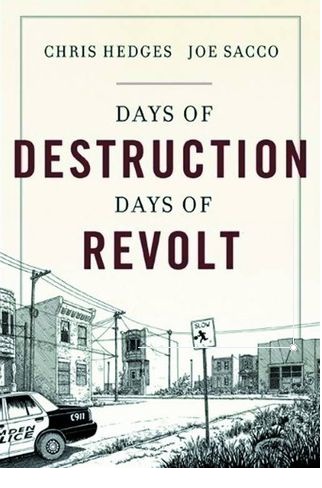 Tim Knight shares a review of the book. Now I can’t wait to read it.
Tim Knight shares a review of the book. Now I can’t wait to read it.
Excerpt from the preface
The ruthless hunt for profit creates a world where everything and everyone is expendable. Nothing is sacred. It has blighted inner cities, turned the majestic Appalachian Mountains into a blasted moonscape of poisoned water, soil, and air. It has forced workers into a downward spiral of falling wages and mounting debt until laborers in agricultural fields and sweatshops work in conditions that replicate slavery. It has impoverished our working class and ravaged the middle class. And it has enriched a tiny global elite that has no loyalty to the nation-state. These corporations, if we use the language of patriotism, are traitors.
Tim says,
I just finished Days of Destruction, Days of Revolt by Chris Hedges and Joe Sacco. It is superb, and I’ve spent a fair amount of time typing in passages from the book below in order to capture some of its theme.
The “me” of twenty years ago wouldn’t be caught dead reading a book like this. It is, after all, an unflinching assasination of our present capitalist system. As a younger person, I was wholeheartedly (and more than a little ignorantly) devoted to a dog-eat-dog, lassiez-faire capitalist system. And, in my adult life, I have lived that way, at least inasmuch as I created, built, and sold a successful business and have, before, during, and after that time, been a very active participant in the financial markets (both by way of trading as well as writing).
Experience and observation have moderated my views, however. At the outset I will say that I still regard capitalism as the most proper, natural, and constructive economic system, but I’m a much firmer believer in a modified version – – consistently-regulated with a distribution of wealth more akin to the 1970s than the present day – – than I ever imagined I would be.
and
There are several broad regions of the United States covered in the book, including the Indian reservations of South Dakota; the mean streets of Camden; the wretched lives of the produce-pickers in Southern Florida; and the “moonscape” of West Virginia’s coal country. It is this last area that includes a talk with Larry Gibson, an activist in West Virginia who grew up there, had to leave for a while due to family poverty, and has returned to try to fight for the region’s sake. He says the following, which is perhaps my favorite section of the entire book:
“Living here as a boy, I wasn’t any different than anybody else. First time I knew I was poor was when I went to Cleveland and went to school They taught me I was poor. I traded all this for a strip of green I saw when I walking the street. And I was poor? How ya gonna get a piece of green grass between the sidewalk and the street, and they gonna tell me I’m poor. I thought I was the luckiest kid in the world, with nature. I could walk through the forest. I could hear the animals. I could hear the woods talk to me. Everywhere I looked there was life. I could pick my own apples or cucumbers. I could eat the berries and pawpaws. I love pawpaws. And they gooseberries. Now there is no life there. Only dust. I had a pigeon and when I’d come out of the house, no matter where I went, he flew over my head or sat on my shoulder. I had a hawk I named Fred, I had a bobcat and a three-legged fox that got caught in a trap. I wouldn’t trade that childhood for all the fancy fire trucks and toys the other kids had.